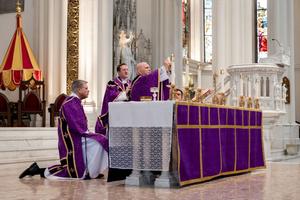Denver Archbishop: Why I Wrote a Pastoral Letter on Marijuana
Archbishop Samuel Aquila warns of the consequences of the legalization and cultural acceptance of drugs.

In a Nov. 28 interview with What We Need Now, the Archbishop Samuel Aquila of Denver explained what motivated him to write a pastoral letter on the dangers of using recreational marijuana and drugs and proposed some principles to deal with this reality, which he himself has witnessed since the legalization of cannabis in Colorado in 2012.
In the interview posted on Substack, the archbishop warned that the legalization and cultural acceptance of drugs has been “devastating” for society and explained why he decided to write his Nov. 10 pastoral letter, “That They May Have Life.”
“I felt a need to speak about the devastating effects witnessed firsthand, especially since many states have followed Colorado’s lead. The legalization of marijuana and cultural acceptance of drug use has been disastrous to our society, and there are limited Catholic resources about it,” Archbishop Aquila said.
Regarding the current perspective that there are “recreational” drugs, as some maintain, the prelate pointed out: “Understanding that we are persons created for loving communion, we can judge that drugs are only an apparent good. They are bad for us since they hinder our ability to know and to love.”
“Drugs diminish our self-possession by harming the very faculties that make us human: They inhibit our use of reason, weaken our will’s orientation toward the good, and train our emotions to expect quick relief from artificial pleasure,” he warned.
The archbishop of Denver noted that the Scriptures teach that “we are made in the image of God. And, as if this isn’t enough, we are invited to eternal union with him.”
“We can sum up the two foundational principles that explain why recreational drugs are immoral,” the prelate continued.
“1) Since the human person is of such value, it is wrong to use any substance that is harmful to human life. 2) Anything that diminishes man’s use of reason and will assails his dignity as a human person and is therefore harmful.”
He also noted that “drugs assault the human person by negatively affecting him on physical, intellectual, psychological, social, and moral levels.”
Regarding the belief that marijuana is not harmful, the archbishop commented that in Colorado they have “witnessed a spike in addiction, with marijuana-use disorder more than doubling in a span of less than 20 years. This is not surprising since Coloradans’ cannabis use has increased dramatically since legalization [in 2012].”
“More people using marijuana inevitably means more addiction,” he pointed out.
The archbishop of Denver said that at the “heart of drug use” two themes are usually found: “a crisis of values and a privation of relational connection that make the person open or susceptible to drug use.”
“While drugs offer fleeting pleasure,” he explained, “Jesus wants to give us a fullness of love, joy and peace that remains constant through life’s peaks and valleys. Rather than reaching for chemicals when we are feeling weary and burdened, Jesus invites us to turn to him, who promises rest and abundance.”
To conclude, he noted that “the most important thing we can do as Christians in response to a drug culture is to proclaim the Gospel.”
He stressed: “It is through the love, mercy, meaning and hope found in Christ that people will be deterred from drug use or inspired to break free of its influence.”
This story was first published by ACI Prensa, CNA’s Spanish-language news partner. It has been translated and adapted by CNA.
















